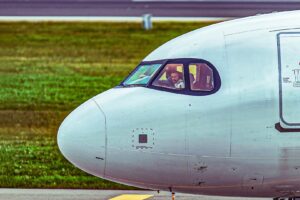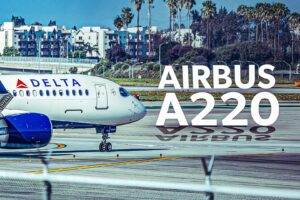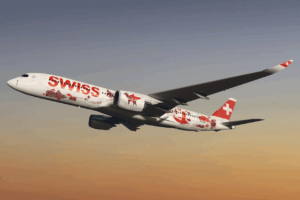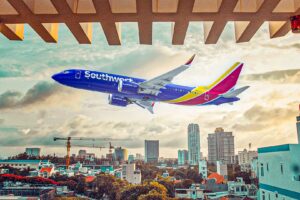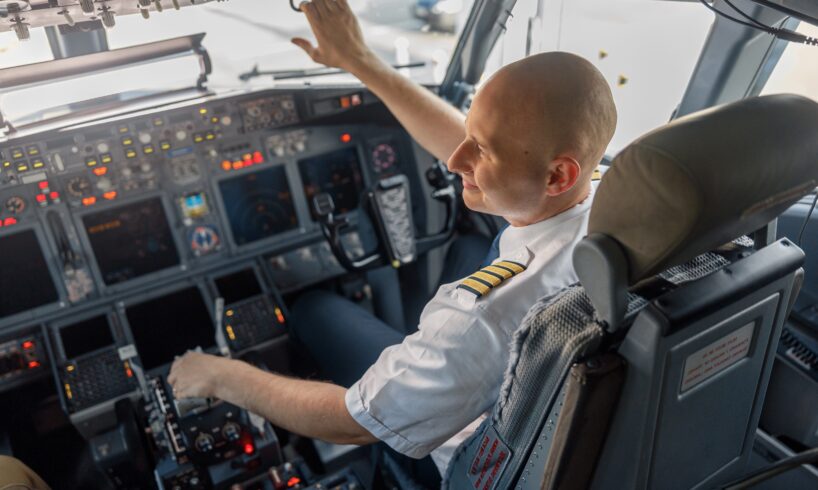
In a world that continues to become increasingly reliant on technology, the question of whether the rise of artificial intelligence (AI) could ever fully replace the role of a pilot raises the question of whether automation could ever completely transform how pilots work. Our highly trained professionals fly us around the world at 35,000 feet. Could AI already be transforming aviation? The short answer is not entirely just yet; however, increased automation continues transforming how pilots work.
Boeing 737
First Delivery
February 10, 1968
As the use of artificial inentirely evolves, it’s not completely new for a pilot, given that 90% of flight time, including take-off and landing (in reliable conditions), is by autopilot. However, pilots and their co-pilots supervise this with immense detail and are ready to step in and intervene where required. Modern aircraft rely on advanced automation, however human judgement remains irreplaceable in chaotic situations, such as emergencies, turbulence, troubleshooting, mechanical failures, and making last minute, split second decisions.
What AI Assistants Help Pilots Do Their Job?
Autopilot systems are the most utilized piece of automated aviation technology today. While several artificial intelligence systems are in place, these use predictive maintenance and research and provide weather routing information to help pilots make human decisions about operating the flight. In essence, AI helps pilots do their jobs but does not replace overall judgment. In the short term, pilots shouldn’t be overly concerned, but must learn to evolve with the development of AI.
Single-pilot proposals have been floated by both Airbus and Boeing
, with research taking place for reduced crew operations, however regulators are fiercely opposed to such an idea that could one day see one pilot operating the aircraft alongside an AI assistant. Interacting with Air Traffic Control is an example that could provide difficulty with AI stepping into the place of a pilot, as they could struggle to make last-minute decisions in chaotic scenarios.
, humans are still better at completing most jobs, and AI could struggle when stepping in during inflight emergencies, such as engine failure or system malfunctions, and making last-minute judgment calls (such as a medical emergency from a passenger or crew member onboard).
What Are The Regulatory Hurdles For AI To Replace Pilots?
Photo: FAA
Several regulatory hurdles will make it hard for AI to break into the pilot’s seat. This is because the Federal Aviation Administration
(FAA) and the European Aviation Safety Agency (EASA) require a minimum of two pilots in the cockpit at all times. Should this ever change, it would take lengthy testing and legal battnsider it in the future.
The public doesn’t trust fully automated aircraft, given the rise in aircraft accidents of late, such as the Boeing 737 MAX controversy. Unions and other lobbyists have been pushing hard to keep pilots in the cockpit, and labor shortages indicate that by 2040, the world will need an additional 600,000 new pilots. Hence, the pressure to cut jobs seems somewhat dumbfounded at present. But what could the future hold?
By the year
What could happen?
In the next 20-30 years
Pilots will remain essential for flight operations. However, AI oversight could shift to assist in crisis management.
In 50+ years
Cargo flights could go pilotless. However, these would need immense research and safety proof to operate unaided.
Pilots are somewhat cautious about the evolution of AI, but they are not panicked. They continue to adapt to new technologies by using advanced avionics and AI systems and advocating to ensure pilots remain in control of the aircraft when making critical decisions. AI test pilot roles have been considered to certify new systems before they are rolled out into the real world.
Related
AI: 5 Ways In Which Artificial Intelligence Is Changing Commercial Aviation
From baggage handling to weather prediction, AI’s possibilities in the aviation industry are limitless.
What Is The Threat Of AI In Aviation?
While it remains unclear how AI will shape the aviation industry for decades, several potential threats could shift aviation and artificial intelligence. The first and most obvious is the move to fully autonomous systems, where AI replaces pilots. While this could take decades, if the systems were proven safe, we could see a move from airlines to single-pilot operations, primarily in cargo or freighters to be with.
Regional travel could also be on the chopping block for pilots, with short-haul flights being automated, similar to self-driving taxis and Uber. While urban air taxis have continued to increase in popularity, and the design of eVTOL is continuing, these will likely start with the use of pilots in the beginning before being rolled out as fully autonomous. What can pilots do to safeguard their jobs?
Upskill
Learn to understand and work with advanced avionics and AI systems
Advocate
Retain control of the critical decision-making needed onboard
Specialize
Pilots are moving into testing to certify new AI systems before they are rolled out for commercial operations.
While pilots don’t need to worry about AI fully replacing their jobs, there is increasing support for the automated use of artificial intelligence to support pilots in their jobs as the industry continues to evolve and face different challenges in technology, financial, and passenger demands.
How Could AI Take Control?
Photo: CactusPilot | Shutterstock
First and foremost, safety is the number one priority of most airlines. Passenger and crew safety comes first, and the industry has built on ensuring that critical decision-making has remained as part of human judgment. However, the idea of delegating these essential decisions to artificial intelligence has been met with industry skepticism.
Many concerns raise anxiety among pilots and airlines as AI continues to take the world by storm. The most prevalent is the fear of unpredictability. Pilots
take years and invest thousands of dollars in training to become pilots and learn to react in emergencies that computer algorithms may not predict. AI could not correct pilot mistakes in real time, resulting in questions about who would remain responsible if lives or property were lost.
In emergencies, passengers look for reassurance from pilots and their crew; this human factor is crucial for connection and ensuring peace of mind for passengers onboard, especially considering that that machine could be the line between life and death in chaotic scenarios. Another fear is the hijacking of critical and personal information. Allowing AI to control this information could allow the potential for hackers to access systems, take control of the aircraft, or share confidential information.
Related
How Airlines Are Revolutionizing Passenger Travel With Artificial Intelligence
From helping with flight connections to finding the next available gate for your aircraft, here’s how airlines are using AI tools.
What Could AI Do With Personal Data In The Aviation Industry?
Photo: Markus Mainka | Shutterstock
Artificial intelligence evolves with more information and data from its users. This has raised concerns within the industry on how personal information is shared through AI systems. The exposure of personal data, such as names, dates of birth, and payment details, has many on edge about how much information airlines hold regarding personal data. Depending on the systems used, there could also be bias, with AI treating various passengers differently due to their data, which could lead to exploitation for commercial purposes.
A cyberattack
remains one of the most prevalent concerns as AI evolves within the industry; with vast amounts of personal data held by airlines (such as through your frequent flier memberships or personal profiles), opportunistic hackers could compromise the privacy of millions of travelers around the globe. Here are some key concerns about what AI and what it could do with personal information:
Privacy
Analyzing personal data without consent
Facial recognition and tracking movements
Profiling or surveillance
Data breaches
Systems managing personal data becoming a target for planned cyberattacks
Hackers exploring AI-driven booking systems to steal information
Discrimination or bias
Algorithms unintentionally discriminate based on race or nationality, screening or pricing
Reliance on automation
AI-driven decisions on baggage handling and boarding
Third-party data
Sharing of data between vendors
Several steps are already taking place to mitigate these concerns, including strict compliance and transparent data policies and encryption with zero-trust security models regulated by trained auditors. Bias testing in AI training data, with increased human oversight, looks to use human fallback protocols with option consent requirements.
Should Pilots Be Concerned About AI?
Photo: Air New Zealand
While the role of a pilot will continue to evolve with AI, there should be no immediate cause for concern. As artificial intelligence gathers pace, we can expect to see pilots in the future becoming overseers of AI systems but not lose the complete hands-on flying that they most likely joined the industry for.
Autonomous systems will likely be the first complete AI-driven systems in the sky. Still, the demand for people, with a global labor shortage for pilots, which will see over half a million shortfall by 2040, reduces the risk of near-term job risks and losses for pilots.
Pilots must continue to evolve with the systems and understand the avionics and automation that AI will bring into the industry. Looking to specialize in training and safety oversight roles will ensure that they remain in control, and with the unions fiercely behind any sudden adoption of AI, it is unlikely to see any drastic change to how we fly in the short term. AI will continue to be the ‘co-pilot’ for the foreseeable future. However, pilots must learn to adapt to remain ahead of the game regarding artificial intelligence and the threat to their position.
Related
Hyderabad Becomes First Airport In India To Utilize AI-Powered Digital Twin System
The new system is called the Airport Predictive Operation Centre (APOC).


